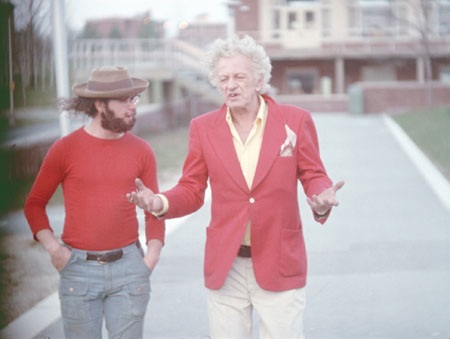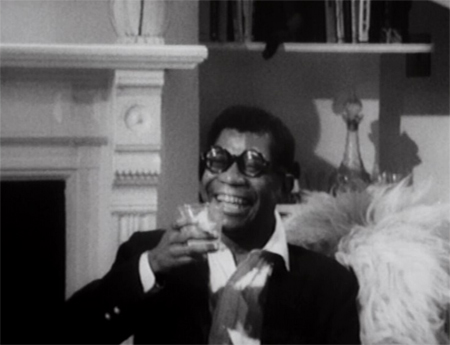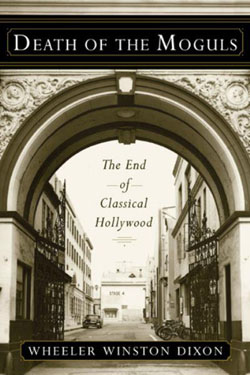“Daily Variety is dead,” announced the New York Times‘ Brooks Barnes last month. “Long live Variety?”
For the past 80 years, Daily Variety has appeared in print, five days a week, but today’s edition will be its last. Penske Media Corporation, which spent $25 million to take over the trade in October, has folded all print operations into a single weekly issue appearing on Tuesdays, redesigned the site and pulled down its paywall, and just hours ago now, made a surprise announcement: Scott Foundas, the former LA Weekly film editor who became an associate programmer at the Film Society of Lincoln Center three years ago, then returned to Village Voice Media as the Voice‘s lead critic just six months ago, will be Variety‘s new chief film critic.
“Foundas’s hire sends a message to [the Hollywood Reporter‘s] Janice Min and other competitors in the increasingly crowded entertainment trade realm,” argues Anne Thompson. “Penske believes in stars and is willing to pay for them. Wisely, he recognizes that Foundas’s name on a review will mean something. Just as he figured out that poaching newshounds Michael Fleming from Variety and Nellie Andreeva from THR would make them must-reads at Deadline.”
Indiewire‘s Eric Kohn and Matt Singer note that the “move marks a return to a sole lead critic at the publication, a spot held for several decades by Todd McCarthy until he was let go in 2010. McCarthy currently holds a similar position at The Hollywood Reporter. Foundas’s history with Variety stretches back to his college days, when McCarthy began assigning him reviews while Foundas was still an undergraduate at USC.”
Reading. The new Senses of Cinema is up, opening with Susan Ray‘s letter to viewers of Nicholas Ray’s We Can’t Go Home Again. Besides the book reviews, festival reports, and a tribute to Albie Thoms (1941-2012), one of the most significant figures of Australian postwar film culture,” Issue 66 also features essays on Douglas Sirk, Howard Hawks’s The Big Sleep (1946), Chris Marker‘s San Soleil (1983), Pier Paolo Pasolini‘s Teorema (1968), David Lynch‘s Mulholland Dr. (2001) and Inland Empire (2006), and Alfred Hitchcock’s Vertigo (1958). Newly inducted into the Great Directors database is Cecil B. DeMille. As it happens, MUBI’s Notebook has just posted Ted Fendt’s translation of Luc Moullet‘s piece on DeMille and The Road to Yesterday (1925), which originally ran in Trafic in 2000.
Catherine Grant alerts us to a new issue of Scope, featuring Sarah Artt on Lynne Ramsay’s Morvern Caller (2002) and reviews of new books on Malick, Welles, Haneke, Akerman, and more. Catherine’s also posted a major new roundup: “Studies of the Remediation of Films, Comics and Video Games.”
“He was a son of Jewish Hollywood royalty, she a Nazi fellow traveler and propagandist.” Bruce Handy recounts a 1945 meeting between Budd Schulberg and Leni Riefenstahl: “Historians who have researched the matter believe one has to allow for the possibility that Schulberg embellished his account, or worse. He was, of course, a professional storyteller, as was Riefenstahl. I think his story has the clear ring of truth; it undeniably has the ring of poetry—of poetic justice.” Tin House is also running an excerpt from Matthew Specktor‘s novel American Dream Machine.
In 1977, Serge Daney and Jean-Pierre Oudart interviewed António Reis for Cahiers du Cinéma, and diagonal thoughts has posted Kelsey Brain, Ted Fendt, and Bill Krohn’s translation.
David Bordwell revisits Shirley Clarke‘s Portrait of Jason (1967): “The movie tells quite a story, but so too does Dennis Doros, VP of Milestone Films and the man whose tenacity brought back this delightful, disturbing record of Jason’s long night.”
“In 1980, at age 32, The Shining seemed a trifle, made by a fading talent,” writes Mark Jacobson. “In 2013, on the verge of Medicare, I saw a completely different movie, a Faustian saga of errant humanity, a sick, sick, sick, black-humored Kafka take on horror-movie conventions, marital relations, and the way synthetic realities tend to drive you crazy.” With Rodney Ascher‘s Room 237 opening in New York in ten days, Jacobson delves into the “Crowded Cult at the Overlook Hotel,” while New York‘s Bilge Ebiri outlines the four main theories that aim to explicate Kubrick’s enigmatic horror film.
Reviewing Cristian Mungiu’s Beyond the Hills for the New York Review of Books, Ian Buruma argues: “What makes the story tragic, instead of merely sad and sordid, is the way Mungiu shows the two realities, the secular and the Orthodox, colliding.”
And in the current issue, Nathaniel Rich revisits the “Nightmare of the West Memphis Three,” revisiting Joe Berlinger and Bruce Sinofsky’s Paradise Lost trilogy and reviewing Amy Berg‘s West of Memphis and Damien Echols’s book Life After Death.
Peter Bogdanovich opens up a new set of files: “The great Polish-German director Ernst Lubitsch was not an absolute favorite of mine while I was keeping my card file of every movie I saw, 1952-1970, so my ratings and comments would be a great deal higher and more effusive today, because over the years he has evolved into one of my all-time top picture artists.”
Books. “With his new book, Death of the Moguls: The End of Classical Hollywood, Wheeler Winston Dixon has performed no mean feat in finding a new and illuminating perspective on what is probably the most written about phenomenon in film history, the Hollywood studio system,” writes Daniel Lindvall, introducing his interview for Film International with Dixon, who in turn, reviews David A. Kirby’s Lab Coats in Hollywood: Science, Scientists, and Cinema: “As a scientific text, and a window into the ways in which those in the sciences view cinema and the related arts, [it] is a fascinating document. But as an examination of the relation between math, science, and the artistic impulse in cinema, it remains outside looking in, not really sure of what it sees.”
At the House Next Door, Clayton Dillard reviews Dwayne Epstein’s Lee Marvin: Point Blank: “Rather than produce a provocative work on a provocative man, Epstein manages to write a clearly admirable biography, though without the blood-pumping tenacity that gives Marvin’s filmic legacy such enduring cultural purchase.”
Viewing. John Wyver presents and contextualizes “the six 15-minute episodes of Orson Welles’ Sketch Book, produced in the 1955 by the BBC, with the great man as host.”
Martin Scorsese introduces the Film Foundation’s 2011 digital restoration of Michael Powell and Emeric Pressburger’s The Life and Death of Colonel Blimp (1943).
More browsing? I recommend John Wyver‘s latest roundup.
For news and tips throughout the day every day, follow @KeyframeDaily on Twitter and/or the RSS feed. Get Keyframe Daily in your inbox by signing in at fandor.com/daily.







